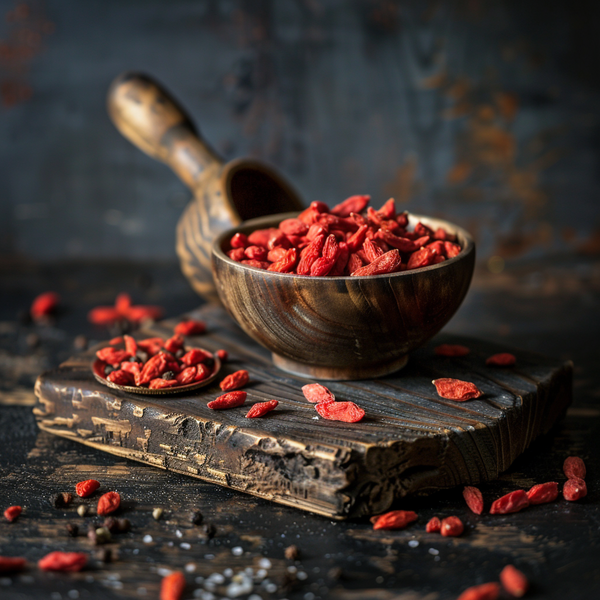
Goji berries
Goji berries, also known as wolfberries, are small, red berries with a slightly sweet and tart flavor, native to Asia. They are renowned for their health benefits, including high levels of antioxidants, vitamins, and minerals. Goji berries can be used fresh, dried, or in juice form and are versatile enough to be incorporated into various culinary applications. Here’s how goji berries are commonly used in cooking:
Teas and Beverages: Dried goji berries are often steeped in hot water to make herbal tea. They can also be blended into smoothies or added to juices for a nutritional boost.
Trail Mix and Snacks: Dried goji berries are a common ingredient in trail mixes, often combined with nuts, seeds, and other dried fruits. They can also be eaten on their own as a healthy snack.
Cereals and Yogurt: Sprinkling dried goji berries over cereal or mixing them into yogurt adds sweetness, texture, and nutritional value to breakfast dishes.
Baking: Goji berries can be incorporated into baked goods such as muffins, cookies, and bread. Their chewy texture and sweet-tart flavor complement a variety of recipes.
Soups and Broths: In traditional Chinese medicine, goji berries are often added to soups and broths for their health benefits. They contribute a subtle sweetness to savory dishes.
Salads: Fresh or dried goji berries can be added to salads for a burst of color and a hint of sweetness, pairing well with a variety of vegetables and dressings.
Grain and Rice Dishes: Goji berries can be cooked along with rice or quinoa, adding a pop of color and sweetness to the dish.
Sauces and Marinades: Goji berry juice or pureed goji berries can be used in sauces and marinades for meat and seafood, adding a unique flavor profile.
Desserts: Goji berries can be used in desserts, such as puddings, fruit bars, and energy balls, where their sweetness enhances the overall taste.
Medicinal Uses: Beyond their culinary applications, goji berries are used in traditional Asian medicine to promote health and longevity, often brewed in teas or included in medicinal soups and tonics.
When using dried goji berries in cooking, it’s often recommended to soak them in water for a few minutes to rehydrate them, making them plumper and softer. This is especially useful when adding them to baked goods or hot dishes. Their nutritional content and unique flavor make goji berries a popular ingredient for those looking to add both health benefits and a touch of sweetness to their meals.
Nutritional Information
calories
321
carbohydrates
69.21 g
fats
-0.21 g
protein
14.07 g